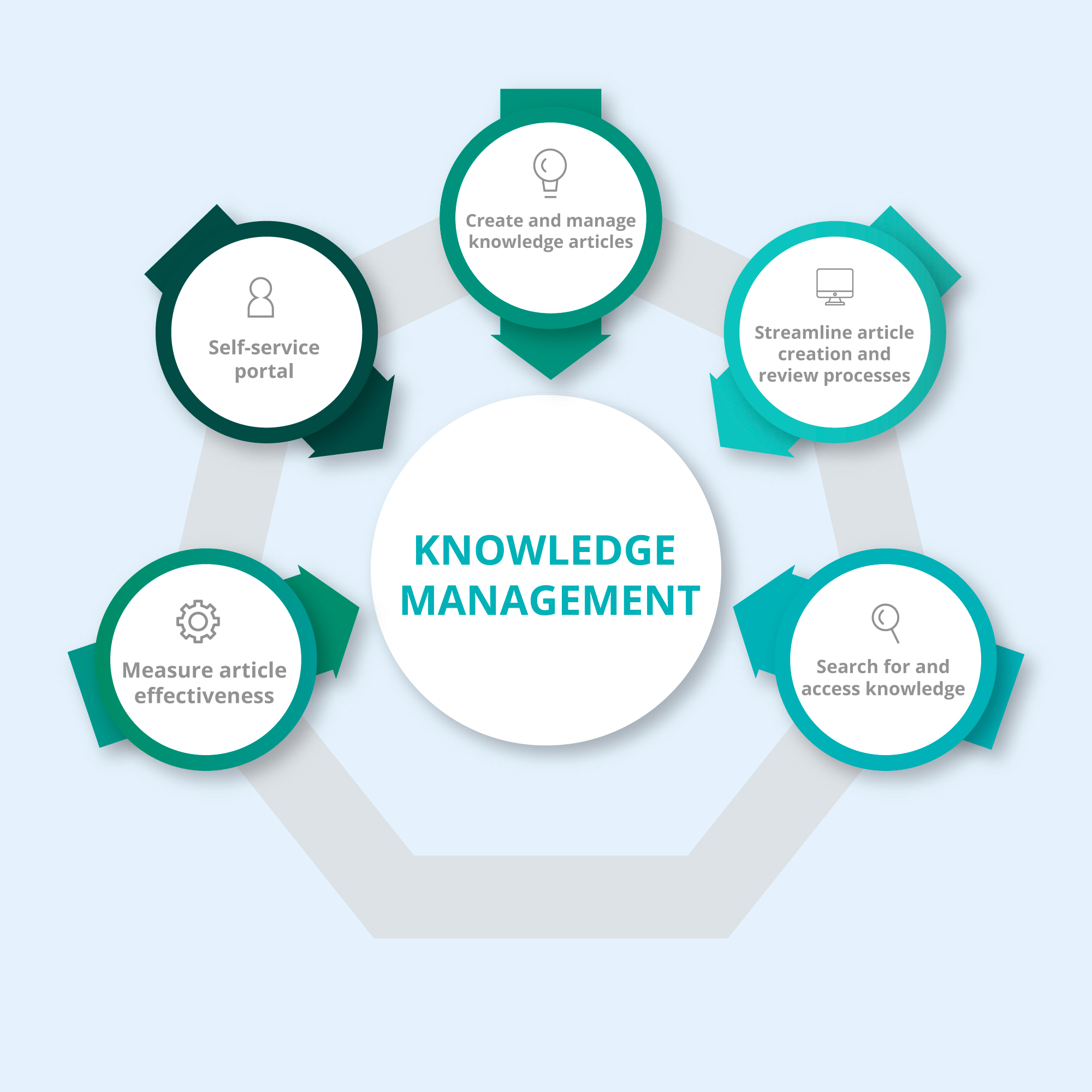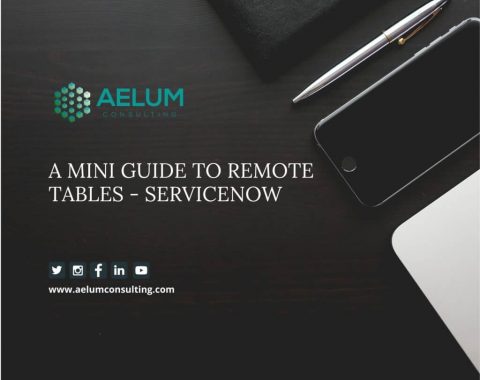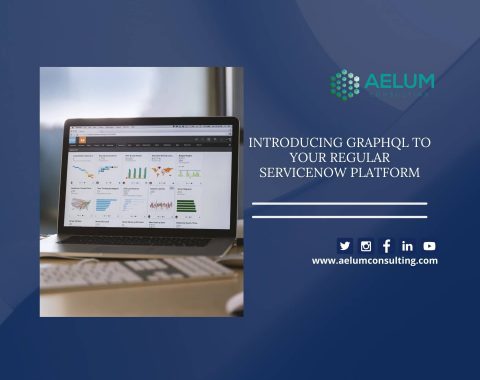Gather, use, and distribute knowledge, resources, and information within an organization

ServiceNow Knowledge Management
Knowledge management is the process of identifying, capturing, organizing, storing, sharing, and utilizing knowledge and information within an organization. It involves creating a culture of knowledge sharing, learning, and leveraging data to improve organizational performance. Effective knowledge management can help organizations improve productivity, reduce costs, and increase innovation. It can also help foster a culture of continuous learning and development, which can be beneficial for both employees and the organization as a whole.
Key Components of Knowledge Management
Knowledge creation
Identifying new information and insights, whether through research, experimentation, or collaboration.
Knowledge capture
Taking the information and insights created and making them accessible to others through documentation, databases, or other means.
Knowledge organization
Structuring and categorizing information in a way that makes it easy to find and use.
Knowledge sharing
Making information available to others, whether through training, mentoring, or other forms of communication.
Knowledge utilization
Applying knowledge and insights to solve problems, make decisions, or create new products or services.
Knowledge Management Process
Knowledge capture
Knowledge organization
Knowledge storage
Knowledge capture
Knowledge organization
Knowledge storage
Knowledge application
Knowledge evaluation
Knowledge Management Benefits
Increased productivity
Work more efficiently by reducing the time and effort required to find and use data. By providing employees with easy access to knowledge and expertise, organizations can increase productivity and reduce duplication of effort.
Reduced risk
Manage risk by capturing and sharing knowledge about best practices, policies, or procedures for risk management. It can help organizations to reduce the likelihood of errors, accidents, or other adverse outcomes.
Improved customer service
Provide better customer service by ensuring that employees have access to accurate and up-to-date information. It can lead to faster resolution of customer issues, improved customer satisfaction, and increased customer loyalty.
Better employee engagement
Effective knowledge management can help to engage employees by providing opportunities for learning, growth, and development. It can help to improve employee morale, job satisfaction, and retention.le
ServiceNow for knowledge management
ServiceNow is a cloud-based platform that provides various enterprise IT management services, including knowledge management. ServiceNow Knowledge Management is a module that enables organizations to capture, manage, and share knowledge. It provides a centralized repository for all organizational knowledge and allows teams to create, review, and publish articles and other content.
Here are some of the ways that ServiceNow can be used for knowledge management:

How can Aelum Consulting support you with ServiceNow knowledge management?
Aelum Consulting is the Premier ServiceNow Partner that can provide various services to support you with different modules in the Now Platform. Here are some of the ways that Aelum Consulting can help you with Knowledge Management:
Implementation and customization
We can help you implement & customize the Knowledge Management module to meet your needs. It includes configuring the knowledge base, creating content, and setting up workflows & approval processes.
Integration with other systems
We can help you integrate ServiceNow Knowledge Management with other enterprise systems, such as CRM and HR. It ensures that knowledge content is accessible and relevant across the organization.
Content creation and management
We can help you develop and manage knowledge content like articles and FAQs. It includes identifying content gaps, creating new content, and updating existing content to ensure it remains relevant and accurate.
Analytics and reporting
Leverage analytics and reporting capabilities to gain insights into the effectiveness of your knowledge management efforts. It includes tracking user behavior, identifying improvement areas, and measuring the impact on key business metrics.
Training and support
We can provide training and support to help you to maximize the value of your ServiceNow Knowledge Management investment. It includes training for employees and administrators, as well as ongoing support to ensure that the system remains up-to-date and effective.
Examples of knowledge management systems
Knowledge bases
A centralized repository of data and expertise accessible to employees, customers, etc. It includes articles, FAQs, and other content and has search and retrieval tools to find information easily.
Content management systems
Used to create, manage, and publish digital content, such as documents, images, and videos. They can store and share knowledge and information within an organization.
Document management systems
Manages documents throughout the lifecycle, from creation and distribution to archiving and deletion. They can store & share critical documents, such as policies and procedures.
Collaboration tools
Tools, such as wikis, chat platforms, and project management software, can be used to facilitate knowledge sharing and collaboration among employees.
Learning management systems
Deliver and manage employee training and development programs. They can be used to provide employees with access to learning materials and to track their progress.
Expert systems
Works as computer programs that simulate the decision-making abilities of a human expert in a particular domain. They can be used to capture and share the knowledge of subject matter experts.
Frequently Asked Questions
Knowledge management is important for several reasons, including:
- Improved decision-making: Organizations with effective knowledge management processes are better equipped to make informed decisions. By capturing and organizing information about best practices, industry trends, and customer preferences, teams can make decisions based on data and insights rather than intuition.
- Increased efficiency: Teams can work more efficiently by reducing the time and effort required to find and share information. By creating a centralized knowledge repository, teams can quickly access the information they need to complete their work.
- Enhanced collaboration: Effective knowledge management can foster collaboration between teams by making it easy to share information and ideas. Teams can work together to create knowledge articles and share their expertise with others, leading to more effective problem-solving and innovation.
- Improved customer satisfaction: Organizations can provide better customer service by ensuring customer-facing teams have access to accurate and up-to-date information. It can lead to faster resolution of customer issues and a more positive customer experience.
- Knowledge retention: Organizations can retain valuable institutional knowledge, even as employees come and go. By capturing and organizing information, organizations can ensure critical knowledge is not lost when employees leave.
There are several events or situations to drive the need for knowledge management in an organization:
- Rapid growth: Organizations experiencing rapid growth may need help to keep up with the increasing volume of information and knowledge they are generating. Implementing a knowledge management system can help these organizations manage their knowledge more effectively, ensuring that critical information is not lost or overlooked.
- Employee turnover: Employees who leave an organization take their knowledge and expertise with them. Knowledge management can help organizations retain this knowledge by capturing it in a centralized repository and making it available to others.
- Merger or acquisition: When organizations merge or are acquired, there is often a need to integrate different knowledge management systems and processes. This centralized knowledge management system can help ensure critical information is recovered during the integration process.
- Compliance requirements: Many organizations are subject to regulatory requirements that require them to capture and manage certain types of information. Knowledge management can help these organizations ensure that they meet these requirements and produce the necessary documentation when required.
- Customer service issues: When organizations are experiencing customer service issues, knowledge management can help them identify the root causes of these issues and develop solutions. Organizations can improve customer service and reduce the likelihood of similar problems by capturing and sharing knowledge about customer issues and solutions.
Overall, knowledge management is driven by the need to capture and manage critical information and knowledge in order to improve organizational performance and achieve business goals.
Our Clients

























































